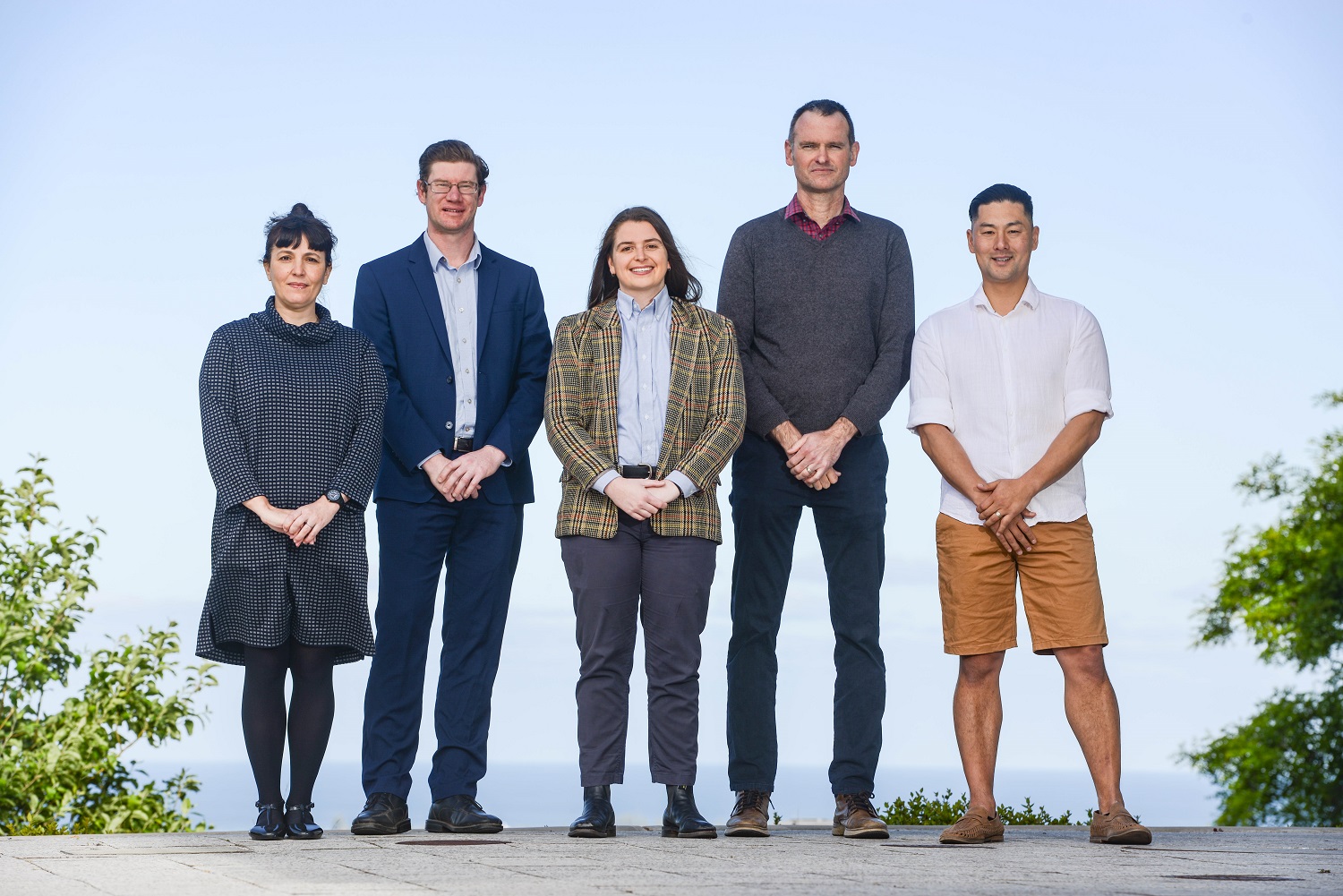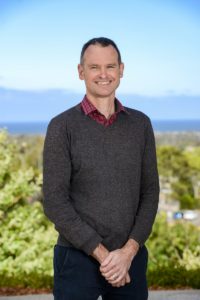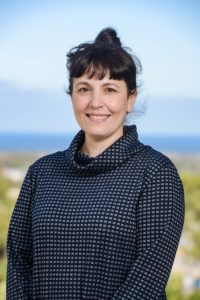
Through the generous support of its donor community and the Research, Development and Support office, Flinders University has this year awarded five emerging researchers with Impact Seed Funding for Early Career Researcher grants.
Dr Lauren Jones, Dr Sam Elliott, Dr Craig Liddicoat, Dr Irene Belperio and Dr Dan Thorpe have each been successful in the program and will receive up to $10,000 to tackle their next big idea.
Deputy Vice-Chancellor (Research) Professor Robert Saint congratulated the successful awardees and said it was heartening to see the future of research at Flinders was in capable hands.
“It is always a challenge to select these winners from the large pool of deserving early career researchers but the number of high-quality applications we receive every year speaks to the quality of research undertaken at Flinders University.
“Across the university, our researchers consistently rise to the challenge of finding new ways of approaching real world problems and finding solutions for the betterment of our community, and I have no doubt today’s grant recipients will go on to make a real impact.”
Impact Seed Funding for Early Career Researcher grants have been awarded to:
Dr Lauren Jones, College of Medicine and Public Health
Mapping the serotonergic pathways that underpin the gut-brain axis
 ‘Anxiety is the most common mental health disorder in Australia, however little is understood of its pathophysiology. We have demonstrated that impaired gut-derived serotonin causes an anxious phenotype. However, the link between gut-derived serotonin and the brain is a significant gap in the field. I aim to use a novel EC cell knockdown (Tph1- DTA) mouse model with advanced microscopy and 3D image analysis to create the first functional circuitry map linking gut-derived serotonin with the brain. Understanding these pathways has significant implications for improving treatment for anxiety.’
‘Anxiety is the most common mental health disorder in Australia, however little is understood of its pathophysiology. We have demonstrated that impaired gut-derived serotonin causes an anxious phenotype. However, the link between gut-derived serotonin and the brain is a significant gap in the field. I aim to use a novel EC cell knockdown (Tph1- DTA) mouse model with advanced microscopy and 3D image analysis to create the first functional circuitry map linking gut-derived serotonin with the brain. Understanding these pathways has significant implications for improving treatment for anxiety.’
Dr Sam Elliott, College of Education, Psychology and Social Work
Understanding parental violence in youth sport
 ‘The aim of this project is to understand the perceptions and psychosocial impact of parental violence on youth participants and identify the thematic construction, maintenance, and perpetuation of interpersonal violence in youth sport. Community clubs and sporting organisations will benefit from raised public awareness and theory-informed advice about maintaining child-safe environments. Understanding the consequences of interpersonal violence will support improved club governance and policy enactment regarding adult involvement in youth sport.’
‘The aim of this project is to understand the perceptions and psychosocial impact of parental violence on youth participants and identify the thematic construction, maintenance, and perpetuation of interpersonal violence in youth sport. Community clubs and sporting organisations will benefit from raised public awareness and theory-informed advice about maintaining child-safe environments. Understanding the consequences of interpersonal violence will support improved club governance and policy enactment regarding adult involvement in youth sport.’
Dr Craig Liddicoat, College of Science and Engineering
Restoring health-promoting environmental microbiomes: Examining the role of
leaf litter and organic debris
 ‘‘This project will help inform future nature-based public health interventions that could save billions of dollars globally, through boosting immune fitness and microbiota-mediated human health at the population level. Health benefits from nature-contact are widely reported with growing evidence of links via exposure to diverse microbial communities from vegetation and soils. I will examine leaf litter/organic debris (an understudied element in health-oriented environmental microbiome exposure studies) within existing NZ-based urban ecosystem restoration study sites, aiming to characterise microbial community structures, environmental drivers, and gene functions relevant to human health.’
‘‘This project will help inform future nature-based public health interventions that could save billions of dollars globally, through boosting immune fitness and microbiota-mediated human health at the population level. Health benefits from nature-contact are widely reported with growing evidence of links via exposure to diverse microbial communities from vegetation and soils. I will examine leaf litter/organic debris (an understudied element in health-oriented environmental microbiome exposure studies) within existing NZ-based urban ecosystem restoration study sites, aiming to characterise microbial community structures, environmental drivers, and gene functions relevant to human health.’
Dr Irene Belperio, College of Nursing and Health Sciences
The experiences of disability support providers supporting older adults with intellectual disabilities and dementia in shared disability supported accommodation
 ‘The project aims to develop an evidence-base in the under-researched area of group home support for adults with intellectual disabilities and dementia in Australia. It seeks to investigate issues around accurate and timely dementia diagnosis; ascertain differences in care type and quantity between adults with intellectual disabilities with and without dementia; and identify current practices of ageing in place, in-place progression, and referral out. The work will provide much-needed pilot data to support applications for larger projects which will contribute to the development of evidence-based policies, practices, and service provision.’
‘The project aims to develop an evidence-base in the under-researched area of group home support for adults with intellectual disabilities and dementia in Australia. It seeks to investigate issues around accurate and timely dementia diagnosis; ascertain differences in care type and quantity between adults with intellectual disabilities with and without dementia; and identify current practices of ageing in place, in-place progression, and referral out. The work will provide much-needed pilot data to support applications for larger projects which will contribute to the development of evidence-based policies, practices, and service provision.’
Dr Dan Thorpe, College of Medicine and Public Health
Paracetamol lowers body temperature by a novel gut-brain pathway
 ‘Paracetamol, an analgesic and antipyretic, is the most commonly used drug worldwide. However, overdose is an increasing clinical issue. Without understanding how Paracetamol works, we cannot hope to develop safer approaches. We have identified a pathway linking gut to thermoregulation. We aim to use novel in vivo approaches to provide key proof of principle data that Paracetamol induces temperature loss through the gut via sensing cells. We envision two major outcomes, development of new drugs activating Paracetamols antipyretic effect through the gastrointestinal tract, and gut-restricted Paracetamol formulations with reduced side effects.’
‘Paracetamol, an analgesic and antipyretic, is the most commonly used drug worldwide. However, overdose is an increasing clinical issue. Without understanding how Paracetamol works, we cannot hope to develop safer approaches. We have identified a pathway linking gut to thermoregulation. We aim to use novel in vivo approaches to provide key proof of principle data that Paracetamol induces temperature loss through the gut via sensing cells. We envision two major outcomes, development of new drugs activating Paracetamols antipyretic effect through the gastrointestinal tract, and gut-restricted Paracetamol formulations with reduced side effects.’
Each year the Impact Seed Funding for Early Career Researchers program helps to launch fearless research projects by emerging researchers, at a critical time in their career.
The seed funding is a vital life blood for these researchers, enabling them to explore new ground, often for their first independent study, while giving them a step-up in their careers. So far, the results have been incredible with important research outcomes for individuals and the community that are providing a springboard to larger projects and greater grant opportunities.
Since 2018, through generous donor support, the Impact Seed Funding for Early Career Researchers program has funded 43 emerging researchers and their innovative research studies.
Passionate about the fearless pursuit of knowledge and helping our emerging researchers succeed? Donate today to support our early career researchers.
Make your support go further, join Flinders’ Staff Workplace Giving program or contact the Advancement Team giving@flinders.edu.au.

